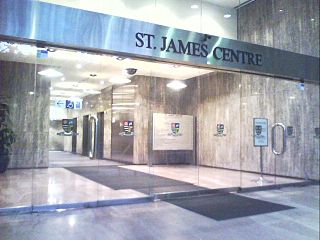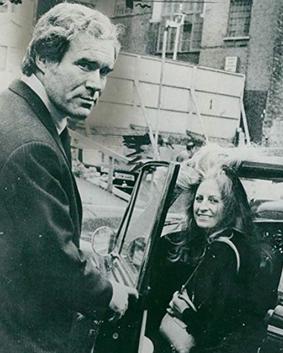Related Research Articles

The Metropolitan Police Service (MPS), formerly and still commonly known as the Metropolitan Police, or simply the Met, is the territorial police force responsible for law enforcement and crime prevention within Greater London. In addition, it is responsible for specialised tasks throughout the United Kingdom, such as dealing with counter-terrorism throughout the UK, and the protection of certain individuals, including the monarch, royal family, governmental officials, and other designated figures. It is also referred to as an eponym as Scotland Yard or the Yard, after the location of its original headquarters in Great Scotland Yard, Whitehall, in the 19th century. The Met is presently headquartered at New Scotland Yard, on the Victoria Embankment.
The Flying Squad is a branch of the Serious and Organised Crime Command within London's Metropolitan Police Service. It is also known as the Robbery Squad, Specialist Crime Directorate 7, SC&O7 and SO7. It is nicknamed The Sweeney, an abbreviation of the Cockney rhyming slang "Sweeney Todd".
The Criminal Investigation Department (CID) is the branch of a police force to which most plainclothes detectives belong in the United Kingdom and many Commonwealth nations. A force's CID is distinct from its Special Branch. The name derives from the CID of the Metropolitan Police, formed on 8 April 1878 by C. E. Howard Vincent as a re-formation of its Detective Branch. British colonial police forces all over the world adopted the terminology developed in the UK in the 19th and early 20th centuries, and later the police forces of those countries often retained it after independence. English-language media often use "CID" as a translation to refer to comparable organisations in other countries.

Operation Spanner was a police investigation into same-sex male sadomasochism across the United Kingdom in the late 1980s. The investigation, led by the Obscene Publications Squad of the Metropolitan Police, began in 1987 and ran for three years, during which approximately 100 gay and bisexual men were questioned by police.

The Royal Commission into the New South Wales Police Service, also known as the Wood Royal Commission, was a royal commission held in the State of New South Wales, Australia between 1995 and 1997. The Royal Commissioner was Justice James Roland Wood. The terms of reference were to determine the existence and extent of corruption within the New South Wales Police; specifically, it sought to determine whether corruption and misconduct were "systemic and entrenched" within the service, and to advise on the process to address such a problem.
Operation Cathedral was a police operation that broke up a major international child pornography ring called The Wonderland Club operating over the Internet. It was led by the British National Crime Squad in cooperation with 1,500 officers from 13 other police forces around the world, who simultaneously arrested 104 suspects in 13 countries on 2 September 1998. The case received widespread international attention due to the highly organised nature of the ring, leading to public concerns of online child sexual abuse and legislative changes in the UK.
Jack Kenneth Slipper was a Detective Chief Superintendent in the Metropolitan Police in London. He was known as "Slipper of the Yard". He was mainly known for his role in investigating the Great Train Robbery of 1963, and in tracking down Ronnie Biggs after he escaped from prison in 1965, although he had to leave Brazil without Biggs.

Sir Robert Mark was a senior British police officer who served as Chief Constable of Leicester City Police, and later as Commissioner of the Metropolitan Police from 1972 to 1977.

The Paedophile Information Exchange (PIE) was a British pro-paedophile activist group, founded in October 1974 and officially disbanded in 1984. The group campaigned for the abolition of the age of consent. It was described by the BBC in 2007 as "an international organisation of people who trade obscene material".
The Specialist Investigation Department is a branch of the Criminal Investigation Department of a British police force which investigates crimes such as murder and sexual offences supplying specially trained officers to monitor known ex-offenders who have a history of sex offences. This unit could be considered the same as Area Major Incident Pool of the Metropolitan Police Service. The Specialist Investigation Officers use the prefix "Detective" in front of their actual police rank. The team also responds to major investigations such as murder when divisional teams can not cope with the sheer amount of work.
The Clubs and Vice Unit was an operational command unit of London's Metropolitan Police which provided advice and practical support to other units in the Metropolitan Police concerning the policing of nightclubs, vice and obscene publications.
The history of the Metropolitan Police in London is long and complex, with many different events taking place between its inception in 1829 and the present day.
The Rochdale child sex abuse ring involved underage teenage girls in Rochdale, Greater Manchester, England. Nine men were convicted of sex trafficking and other offences including rape, trafficking girls for sex and conspiracy to engage in sexual activity with a child in May 2012. This resulted in Greater Manchester Police launching Operation Doublet and other operations to investigate further claims of abuse. As of January 2024 a total of 42 men had been convicted resulting in jail sentences totalling 432 years. Forty-seven girls were identified as victims of child sexual exploitation during the initial police investigation. The men were British Pakistanis, which led to discussion on whether the failure to investigate them was linked to the authorities' fear of being accused of racial prejudice. The girls were mainly White British.

Operation Yewtree was a British police investigation into sexual abuse allegations, predominantly the abuse of children, against the English media personality Jimmy Savile and others. The investigation, led by the Metropolitan Police (Met), started in October 2012. After a period of assessment, it became a full criminal investigation, involving inquiries into living people, notably other celebrities, as well as Savile, who had died the previous year.
A dossier on paedophiles allegedly associated with the British government was assembled by the British Member of Parliament Geoffrey Dickens, who handed it to the then-Home Secretary, Leon Brittan, in 1984. The whereabouts of the dossier is unknown, along with other files on organised child abuse that had been held by the Home Office.

Richard William Huckle was an English serial child rapist. He was arrested by Britain's National Crime Agency in 2014 after a tip-off from the Australian Federal Police and convicted in 2016 of 71 charges of sexual offences against children, committed while he served as a Christian missionary and a freelance photographer in Malaysia.
In 2010, police received a report of a child sex ring in Norwich, England. The recurring crimes spanned 10 years and all victims, two boys and three girls, were younger than 13. The perpetrators organized sex parties where adults played card games to decide who would abuse which child. Three members of the gang received significant prison sentences, including ringleader Marie Black, who was jailed for life. Black's sentence made her "one of the UK's most notorious paedophiles."
Operation Voicer was a major police investigation into serious sexual offences against pre-school aged children and infants across England, launched in 2014. The perpetrators groomed the families of the young victims, in some cases before the babies were even born. By September 2015, seven offenders were jailed, 28 further suspects had been arrested, three victims were identified, and 33 children were safeguarded. Ten offenders received significant prison sentences.

James William Humphreys was an English businessman and criminal who owned a chain of adult book shops and strip clubs in London in the 1960s and 1970s. He was able to run his business through the payment of large bribes to serving police officers, particularly those from the Obscene Publications Branch (OPB) of the Metropolitan Police. His diaries—which detailed meetings he had held with police officers, the venues of the meetings and the amounts of bribes paid—provided evidence for the investigation by anti-corruption officers of the Metropolitan Police.
Beechwood children's home was a care home for children in Mapperley in Nottinghamshire, England, where staff committed serious sexual and "sadistic" abuse against children spanning several decades before it closed in 2006. Some abusive staff received lengthy prison sentences.
References
- ↑ "Paedophile Unit". Metropolitan Police Service. Archived from the original on 19 July 2012. Retrieved 13 March 2015.
- ↑ 'Park sting' paedophile is jailed, BBC News, 1 September 2006
- ↑ Inside the Mind of a Paedophile
- ↑ Paedophile campaigner is jailed
- ↑
- Paedophile unit raids cyber cafe BBC News, 7 September 2005
- ↑ "Clean Sweep", Time Out , 9–16 October 1991, p.10
- ↑ "Big changes in control of Metropolitan Police", The Times , 24 April 1972
- ↑ "Five detectives jailed for pornography conspiracy", The Times , 23 December 1976
- ↑ "Former Yard chiefs sentenced to 12 years", The Times , 14 May 1977
- 1 2 BBC In Dark Corners podcast team (8 January 2025). "Men on 1970s pro-paedophile list could still work with children today". BBC News.
- ↑ Attwood, Feona; Campbell, Vincent; Hunter, I. Q.; et al., eds. (2013). Controversial Images: Media Representations on the Edge (illustrated ed.). Palgrave Macmillan. p. 117. ISBN 9780230284050 . Retrieved 13 March 2015.[ permanent dead link ]